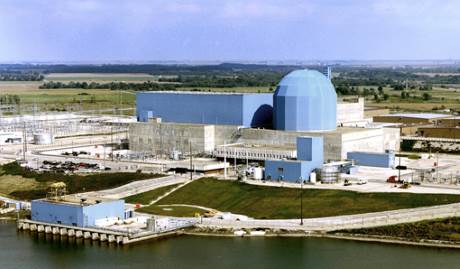The US Department of Justice (DOJ) and the Federal Energy Regulatory Commission (FERC) have submitted a statement to a court of appeal saying federal rules do not pre-empt Illinois' zero emission credit (ZEC) programme. The court is hearing an appeal against an earlier ruling that dismissed a lawsuit aimed at invalidating the programme, which provides financial support to Exelon's Quad Cities and Clinton nuclear power plants.
 |
| Exelon's Clinton plant, which will benefit from the legislation (Image: Exelon) |
Senate Bill 2814, the Future Energy Jobs bill, was passed by the state legislature on 1 December 2016. Illinois governor Bruce Rauner signed the bill into law six days later. The bill will see Illinois expand clean energy production while protecting jobs and maintaining competitive electricity rates, with caps and protections to limit the impact on consumers and businesses. It recognises the contribution of nuclear power generation to the state's zero-carbon emission generation and ensures that the Clinton and Quad Cities nuclear power plants can remain open. Without the legislation, both plants had faced closure.
Two lawsuits were filed with the US District Court for the Northern District of Illinois to challenge the ZEC programme. The first case was brought by consumer plaintiffs including Village of Old Mill Creek, Ferrite International Company, Got It Maid Inc, Nafisca Zotos, Robert Dillon, Richard Owens, and Robin Hawkins. They are all delivery services customers of Commonwealth Edison in Illinois. The second case was filed by the Electric Power Supply Association and independent power producers Calpine Corporation, Dynegy Inc, Eastern Generation LLC and NRG Energy Inc.
Both the consumer plaintiffs and the generator plaintiffs brought claims against Illinois Power Agency director Anthony Star and the commissioners of the Illinois Commerce Commission seeking to invalidate the Future Energy Jobs bill. They claimed that the legislature's asserted goal for the statute, "environmental protection", was a "mere pretext for a bailout" for Exelon's Clinton and Quad Cities plants.
On 14 July 2017, a federal judge dismissed the two lawsuits. Judge Manish Shah said, "The ZEC programme falls within Illinois' reserved authority over generation facilities. Illinois has sufficiently separated ZECs from wholesale transactions such that the Federal Power Act does not pre-empt the state programme."
The plaintiffs immediately filed an appeal against the ruling with the 7th US Circuit Court of Appeals in Chicago. That court issued an order on 21 February inviting the United States to express the views of the government on the matter.
In a joint brief to the court, submitted on 29 May, DOJ and FERC said: "The Illinois programme is not pre-empted. It does not require participation in FERC-jurisdictional wholesale auctions as a precondition to receive ZECs. Rather, the Illinois ZEC is 'targeted' at an attribute of generation resources over which Illinois has regulatory authority; any spillover, indirect effect on wholesale electricity markets over which the Commission has authority does not warrant pre-emption."
Exelon said in a statement: "Today the US Department of Justice and the Federal Energy Regulatory Commission told the courts that states are free to favour clean nuclear energy over pollution-emitting energy from coal, oil and natural gas power plants.
"We remain confident that the courts will uphold the view of policymakers and regulators who support the continued operation of Illinois' nuclear plants and the environmental benefits they provide for consumers."
Researched and written
by World Nuclear News







_94566.jpeg)






